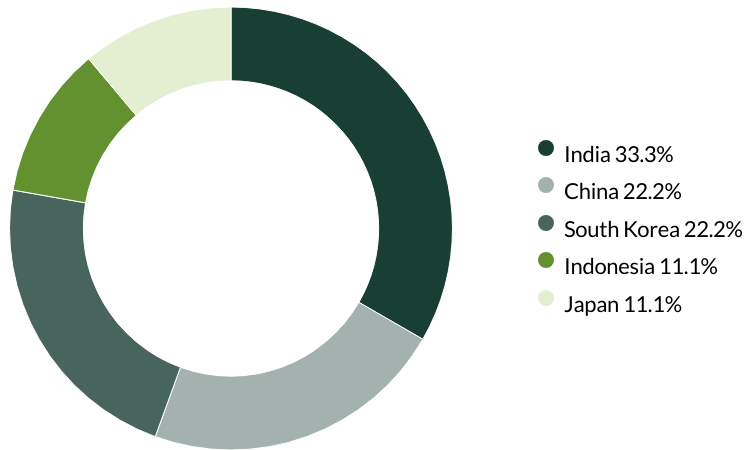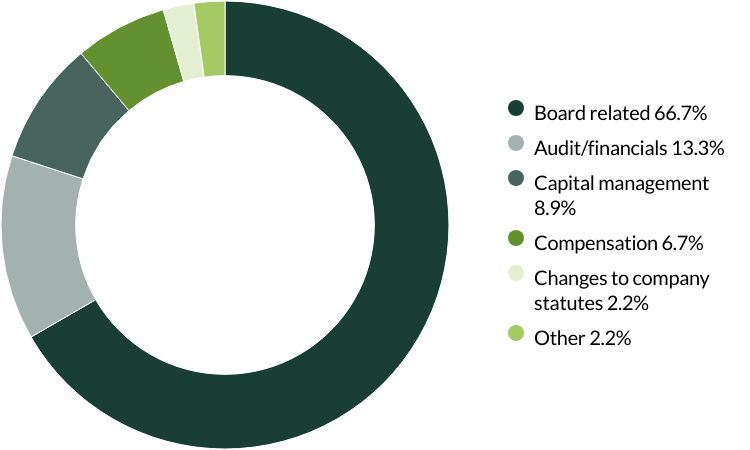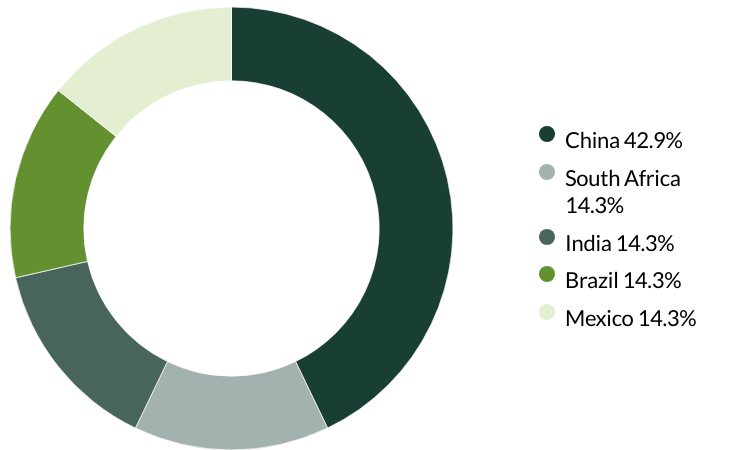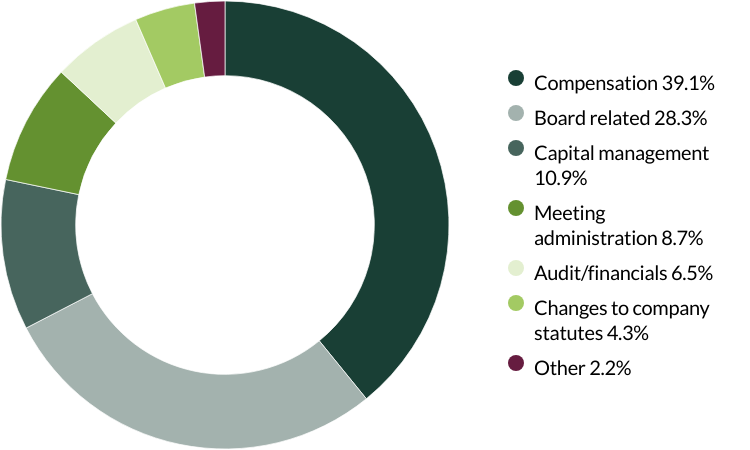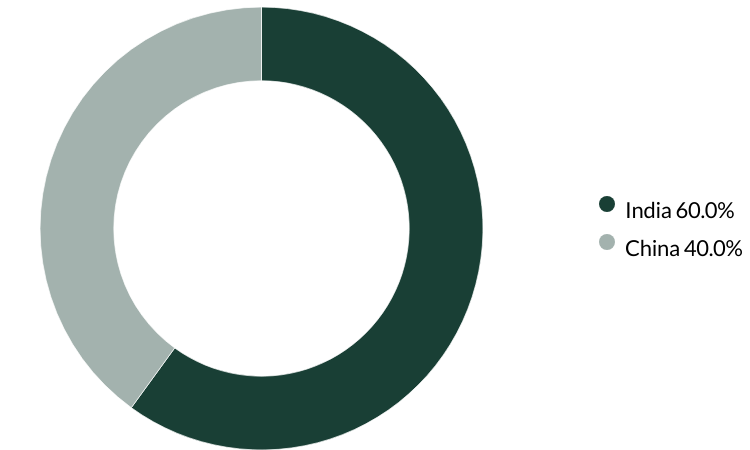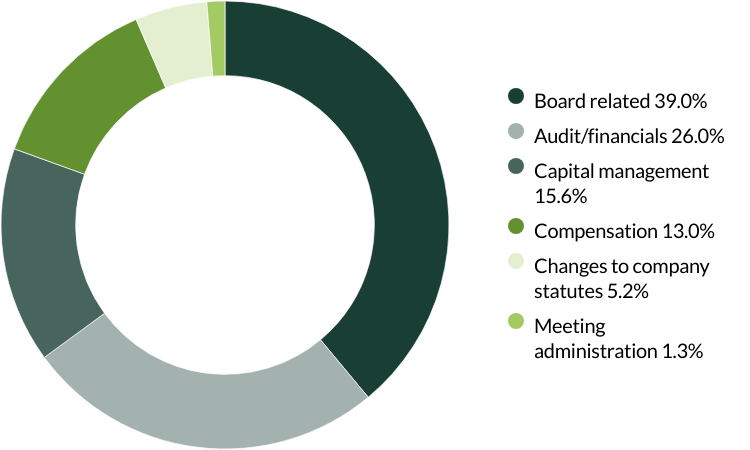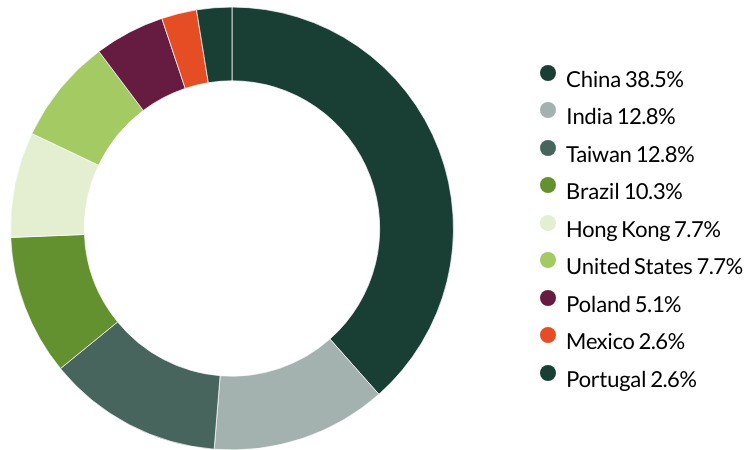Get the right experience for you. Please select your location and investor type.

Global Emerging Markets Leaders
The strategy invests in 25-60 high-quality emerging markets companies that we consider to be well positioned to contribute to, and benefit from, sustainable development.
The strategy was launched in April 2020. It invests in the shares of between 25-60 companies in emerging markets.
A Leaders strategy generally invests in market leading companies which means, for this strategy, that they are valued at over US$1 billion.
You can see all of the companies that this strategy invests in by filtering on our Portfolio Explorer tool.
- We define investment risk as losing clients’ money – this means we focus on looking after your money as well as growing it
- Companies must contribute to sustainable development and make a positive impact towards a more sustainable future. Portfolio Explorer >
- We invest in high-quality companies with exceptional cultures, strong franchises and resilient financials. How we pick companies >
- We avoid companies linked to harmful activities and engage and vote for positive change. Our position on harmful products >
Quarterly updates
Strategy update: Q1 2025
Global Emerging Markets Leaders strategy update: 1 January - 31 March 2025
With the threat of US tariffs ever present, many of the challenges emerging markets faced in the final quarter of 2024 carried over into 2025. Share prices in India fell sharply due to concerns about a slowdown in the economy. China, by contrast, performed well as investors anticipated faster economic growth and began to identify value in many parts of the market. This sentiment was also supported by President Xi, who met executives from a number of private-sector companies.
We added 10 new holdings over the quarter and sold seven. In China, we sold Glodon (China: Information Technology), Hangzhou Robam (China: Consumer Discretionary), WuXi Biologics (China: Health Care), Ping An Insurance (China: Financials) and Hong Kong Exchanges and Clearing (Hong Kong: Financials). We sold the first two companies because we believe the country's property market continues to have an issue with oversupply. Glodon provides software to construction and development companies and the majority of Hangzhou Robam’s appliances are sold to housing developers. WuXi Biologics was a small position and we couldn’t see any immediate prospect that the ongoing challenges posed by US government trade policy would be resolved. Although Ping An Insurance and Hong Kong Exchanges and Clearing had both performed well, we sold them to fund new investment ideas such as Alibaba (China: Consumer Discretionary), S.F. Holding (China: Industrials) and Mindray (China: Health Care).
Alibaba is one of China’s leading e-commerce platforms. S.F. Holding has grown into one of China’s leading logistics businesses since its foundation in 1992. Mindray is a leading medical company. As trade barriers are thrown up around the world, it has the potential to benefit should there be a shift in China towards buying domestically sourced products.

Elsewhere, we added a handful of new holdings and trimmed the size of some existing positions. We took some profits in Marico (India: Consumer Staples) and reinvested the proceeds in Info Edge (India: Communications), Tube Investments (India: Consumer Discretionary), Bajaj Auto (India: Consumer Discretionary) and Bajaj Holdings & Investment (India: Financials). These companies had been on our focus list for a while but their previously high valuations had put us off investing. InfoEdge is a technology company whose online jobs portal caters to 132,000 corporate customers and hosts around 100 million CVs1. It also has property, matchmaking and educational portals. Tube Investments is an industrial group whose share price had fallen sharply, providing us with what we believe is an excellent buying opportunity. Bajaj Auto also fell, allowing us to add this leading manufacturer of motorcycles, scooters and auto rickshaws. Bajaj Holdings & Investment is the holding company of siblings Rajiv and Sanjiv Bajaj. They have demonstrated a good track record of delivering returns for shareholders in autos and financial services.
We sold convenience store business Dino Polska (Poland: Consumer Staples), which had performed well but which had become too expensive for its long-term growth expectations. We also sold Unicharm (Japan: Consumer Staples). In response to demographic change it has shifted its emphasis to making adult diapers but it has found this shift harder that it had originally envisaged.
Elsewhere, we bought Samsung Biologics (South Korea: Health Care), Alfamart (Indonesia: Consumer Staples), Voltronic Power (Taiwan: Industrials) and BDO Unibank (Philippines: Financials). With the financial backing of its parent company, we believe Samsung Biologics can add capacity more quickly than its competitors and win market share. Alfamart is the second biggest company in Indonesia’s convenience-store sector2. It plans to roll out new stores across the country over the next decade. Its shares fell as the market took fright at Indonesia’s new government but we can see a clear and dependable growth path before it. Voltronic Power makes uninterruptible power supply units (PSUs). We expect demand for these to increase steadily as a new generation of data centres is built worldwide. Finally, BDO Unibank is the Philippines’ largest financial lender3.
While we are broadly positive on the outlook for emerging markets, we recognise that there is likely to be ongoing volatility for as long as worries about trade tariffs and global political tensions remain at elevated levels. Our task is to block out the short-term noise to focus on the underlying quality, growth and leadership of the companies we invest in.
[1] Source: InfoEdge: Annual Report 2023-24.
[2] Source: Fitch Ratings Fitch Revises Alfamart's Outlook to Positive; Affirms at 'AA(idn)'.
[3] Source: BDO Unibank – Company Profile (as of 31 December 2024).
Source for company information: Stewart Investors investment team and company data. This stock information does not constitute any offer or inducement to enter into any investment activity. Portfolio data shown is from representative strategy accounts of the strategy shown above. Named new investments disclosed relate to holdings with a portfolio weight over 0.5%. It is not a recommendation or solicitation to purchase or invest in any fund. Differences between the representative account-specific constraints, currency or fees and those of a similarly managed fund or mandate would affect results.
Strategy update: Q4 2024
Global Emerging Markets Leaders strategy update: 1 October - 31 December 2024
Through the last quarter of 2024, stock markets had to deal with the re-election of Donald Trump in the United States and all the expected world and political noise that will come over the next four years. At the same time the US dollar currency continued to strengthen. We remain focused on our investment process and investing in high-quality companies. We will continue to seek out long-term growth opportunities regardless of who is the President in the White House.
During the quarter, we bought Naver (South Korea: Communication Services), the leading internet search engine in South Korea. It was originally part of Samsung SDS before it became a separate company in 1999. It is still managed by the founder, Lee Hae-jin who has recently brought in a new management team which is aiming to return the company to a path of steady and profitable growth. One key aim for them is to use their large and stable search engine client base to drive growth in their e-commerce business. Their e-commerce business, which includes advertising, sales and memberships, is the second largest in South Korea2. We believe that Naver should achieve strong growth in the future and its attractive valuation gave us a good opportunity to invest at this time.
We did not fully exit any positions during the quarter but trimmed back several of our Chinese holdings. These included Inovance (China: Industrials) which was becoming expensive, and Ping An Insurance (China: Financials) and Hong Kong Exchanges and Clearing (Hong Kong: Financials) which were trimmed to control larger position sizes. We build our portfolios by investing in individual companies and any views at a country level are reflected through the position size which is weighted according to our confidence and risk appetite in each country. China has a large and deep stock market but we fully recognise that companies both in mainland China and Hong Kong are required to operate within very strict regulations set by the government. As a result, we typically have lower position sizes in our Chinese holdings to reflect our more cautious approach. Some of the proceeds raised from these trims was used to add to Samsung Electronics (South Korea: Information Technology), which we continue to believe is a company we can own for the next decade.

We continue to look for high-quality companies which we can buy at reasonable valuations. We believe that valuations in emerging markets are currently very attractive. Additionally, we see numerous long-term growth opportunities that we can support over the next decade. The team is planning many research trips for 2025 to seek out new investment opportunities and update our knowledge of existing holdings. We look forward to sharing more with you as the year progresses.
1 Source: MSCI Index Factsheets as at 31 December 2024. All data USD, total returns.
2 Source: External market research.
Source for company information: Stewart Investors investment team and company data. This stock information does not constitute any offer or inducement to enter into any investment activity. Portfolio data shown is from representative strategy accounts of the strategy shown above. Named new investments disclosed relate to holdings with a portfolio weight over 0.5%. It is not a recommendation or solicitation to purchase or invest in any fund. Differences between the representative account-specific constraints, currency or fees and those of a similarly managed fund or mandate would affect results.
Strategy update: Q3 2024
Global Emerging Markets Leaders strategy update: 1 July - 30 September 2024
Most of the quarter’s activity happened in September, as is often the case. It is in such moments, like the biggest stock market moves since 2009 in China and Hong Kong and rising geopolitical tensions in the Middle East, that we remain grateful for our long-term philosophy. It gives us the ability to step back in moments of such unpredictable change and reminds us to focus on what we believe are more important, company-focused drivers of change.
We sold two positions in China, unfortunately before the recent stock market rally. We used the sale proceeds to reallocate into other Chinese companies in the portfolio where we had greater confidence.
Estun Automation (China: Industrials) was a company we had sold on valuation concerns in the past, and when the share price fell sharply earlier this year, we bought it again. Long-term growth opportunities such as an ageing population needing more automation remains intact but financial risk had elevated and we quickly concluded that the quality of business was lower than when we had owned the company previously. We allocated the funds into Inovance (China: Industrials), which operates in the same sector but has a larger variety of products. Inovance is looking to shift to a regional sales network and cross sell products to their existing customer base. We believe the company provides access to industrial automation growth in a higher quality business.
The other stock we fully exited in China was Kingmed Diagnostics (China: Health Care) which was a small remaining position and had already been partly sold down on regulatory fears.
We also sold Kotak Mahindra Bank (India: Financials). We have seen Kotak, and other private banks, finding it harder to attract deposits that will allow them to keep growing loans. In India, it used to be the case that public sector banks were so poorly thought of and untrusted that few people and businesses would risk their savings at one of these government-owned banks. The public sector banks have now improved and professionalised which is great for the Indian saver and borrower but tougher for the private sector banks like Kotak who now face tougher competition from the public sector banks. With prospects for growth looking weaker and some remaining concerns about company management, we exited the position.
The only new position we purchased over the quarter was Regional (Mexico: Financials), a bank focused on small and medium-sized enterprise (SME) lending in Mexico. The company has been growing its share of the market in its home region of Nuevo Leon and in the foreign-owned factories of Mexico, known as maquiladoras, which supply the United States economy. Regional’s bankers are rewarded on the quality of the loans rather than loan growth and if non-performing loans (NPL) in their portfolio tip over 1% then the bankers lose their annual bonus. This helps keep the rate of loans that are not performing low, and one of the lowest in the country. We believe that Regional is attractively valued and growth should come from expansion into other areas of Mexico, including Mexico City where the company currently only has a small share of the market.
We continue to discuss our China company holdings at length, especially considering the recent stock market moves. But another area where we are doing a lot of thinking is Poland. Here we hold Allegro (Poland: Consumer Discretionary), Dino Polska (Poland: Consumer Staples) and Jerónimo Martins (Portugal: Consumer Staples), which is listed in Portugal but >50% of sales are from its Biedronka business in Poland.1 They all experienced strong growth through 2022 and 2023 as food price inflation helped them increase profits but the opposite has now happened. Deflation in food prices and rising costs have reduced profit margins.
As always, we spend most of our time continuing to understand as much as we can about the quality of the management, business franchise and financials of the companies we invest in and also continue to look for new ideas to add to the portfolio.
1 Source: Jerónimo Martins Annual Report 2023
Source for company information: Stewart Investors investment team and company data. This stock information does not constitute any offer or inducement to enter into any investment activity. Portfolio data shown is from representative strategy accounts of the strategy shown above. Named new investments disclosed relate to holdings with a portfolio weight over 0.5%. It is not a recommendation or solicitation to purchase or invest in any fund. Differences between the representative account-specific constraints, currency or fees and those of a similarly managed fund or mandate would affect results.
Strategy update: Q2 2024
Global Emerging Markets Leaders strategy update: 1 April - 30 June 2024
We have seen a continuation of geopolitical surprises throughout the quarter which have caused short-term volatility (rapid and unpredictable price fluctuations).
Claudia Sheinbaum was elected the first female President of Mexico with a large victory that her party now holds a two-thirds majority in both congressional houses and means it could make constitutional changes. India completed the largest democratic election in the world with a surprise vote removing Narendra Modi and the Bharatiya Janata Party’s absolute majority in the Lok Sabha (also known as the House of the People and the lower house in the Indian Parliament). The Nifty 50 (top 50 stocks by market capitalisation listed on the National Stock Exchange of India) rose the day before the election on the expectation that Modi would get over 400 seats. It then fell 7% when the news broke that he had lost his absolute majority before rising again in the days afterwards as the market decided Modi staying in power with a reduced majority was a positive for Indian democracy1. It is at times like this that we are thankful for our philosophy and process which focuses on the quality of individual companies over a long period of time.
We sold out of eight companies and only added one through the second quarter which is higher turnover than previous quarters. We sold Vitasoy (Hong Kong: Consumer Staples) after they changed their management team in Australia; but given the share price has fallen quite sharply it has been a frustrating position and we believe we can find better ideas elsewhere. We sold Amoy Diagnostics (China: Health Care) after a period of better performance. Whilst we still like the way the business is managed, the high financial performance generated in the healthcare sector means we have become worried about the regulatory environment stepping in to reduce those margins. Another Chinese position we sold is Foshan Haitian Flavouring & Food (China: Consumer Staples), a food flavouring and seasoning producer that has seen its operating profit margin reduce over the longer term and we don’t see a catalyst for them to recover.
We also sold Tech Mahindra (India: Information Technology) and Dabur (India: Consumer Staples) having bought into both in 2009. Tech Mahindra (known then as Satyam) and Dabur have delivered good performance since first bought. Whilst we still believe that they are good companies, valuations are becoming problematic. Tech Mahindra has been a great investment over the last ten years but we believe we have a better option for the next ten years in Tata Consultancy Services (India: Information Technology). Tech Mahindra has seen profit margins reduce and it is also expensive. Dabur is a soaps and detergents producer in India which has delivered successful financial results but we expect growth to be lower in the future. Valuations in India remain one of our biggest concerns and we have been trimming back our positions there including Marico (India: Consumer Staples) and Mahindra & Mahindra (India: Consumer Discretionary) due to valuations. We also sold Pigeon (Japan: Consumer Staples) as we lost confidence in the speed and extent of the evolution of the business which is facing rising challenges (headwinds) such as declining birth rates.
Finally we sold out of Banco Bradesco (Brazil: Financials) and Infineon Technologies (Germany: Information Technology). Infineon is a semiconductor designer and manufacturer mainly serving the automotive sector and it is moving into software solutions, but we feel there are better ideas elsewhere. Banco Bradesco was a mistake which we are rectifying by exiting the position. We underestimated the impact of Nubank (a financial technology bank, known as a neobank) on the country’s banking sector and Banco Bradesco is behind in providing more advanced digital banking services. To compete, the company would have to change substantially at a time when Brazil’s economy is looking uncertain.
The only new company we have purchased is Bidcorp (South Africa: Consumer Staples). It is a specialist logistics company focused on fresh and frozen foods with operations in 35 countries. They have a strong financials including low debt levels. We are hopeful that they will be able to improve diversity at the board level but the business has been well managed over the years and we are happy to build a position as they look to expand in less developed markets.
We have been selectively adding to some positions in technology companies where we took advantage of price movements to continue building a long-term position. We added to Samsung Electronics (South Korea: Information Technology) as we believe it is in the early stages of a memory cycle recovery. We also added to Globant (Argentina: Information Technology) which suffered as IT capital expenditure (capex) was postponed by several customers, but growth has held up better than we expected and we don’t see it as too expensive.
1 Source: Bloomberg
Source for company information: Stewart Investors investment team and company data. This stock information does not constitute any offer or inducement to enter into any investment activity. Portfolio data shown is from representative strategy accounts of the strategy shown above. Named new investments disclosed relate to holdings with a portfolio weight over 0.5%. It is not a recommendation or solicitation to purchase or invest in any fund. Differences between the representative account-specific constraints, currency or fees and those of a similarly managed fund or mandate would affect results.
Proxy voting
Proxy voting: Q1 2025
Global Emerging Markets Leaders proxy voting: 1 January - 31 March 2025
Proxy voting by country of origin
Proxy voting by proposal category
During the quarter there were 45 resolutions from eight companies to vote on. On behalf of clients, we voted against five resolutions.
We voted against executive remuneration at Bank Central Asia because we believed it was excessive. (one resolution)
We voted against the election of two directors and an audit committee member at Samsung Electronics as we do not believe them to be truly independent. (three resolutions)
We voted against the election of the audit committee chair at Unicharm as we do not believe they are independent. (one resolution)
Source for company information: Stewart Investors investment team and company data. This stock information does not constitute any offer or inducement to enter into any investment activity. Portfolio data shown is from representative strategy accounts of the strategy shown above. Proxy voting chart numbers may not add to 100 due to rounding. SHP means: Shareholder Proposal.
Proxy voting: Q4 2024
Global Emerging Markets Leaders proxy voting: 1 October - 31 December 2024
Proxy voting by country of origin
Proxy voting by proposal category
During the quarter there were 46 resolutions from seven companies to vote on. On behalf of clients, we did not vote against any resolutions.
Source for company information: Stewart Investors investment team and company data. This stock information does not constitute any offer or inducement to enter into any investment activity. Portfolio data shown is from representative strategy accounts of the strategy shown above. Proxy voting chart numbers may not add to 100 due to rounding. SHP means: Shareholder Proposal.
Proxy voting: Q3 2024
Global Emerging Markets Leaders proxy voting: 1 July - 30 September 2024
Proxy voting by country of origin
Proxy voting by proposal category
During the quarter there were 77 resolutions from nine companies to vote on. On behalf of clients, we did not vote against any resolutions.
Source for company information: Stewart Investors investment team and company data. This stock information does not constitute any offer or inducement to enter into any investment activity. Portfolio data shown is from representative strategy accounts of the strategy shown above. Proxy voting chart numbers may not add to 100 due to rounding. SHP means: Shareholder Proposal.
Proxy voting: Q2 2024
Global Emerging Markets Leaders proxy voting: 1 April - 30 June 2024
Proxy voting by country of origin
Proxy voting by proposal category
During the quarter there were 430 resolutions from 35 companies to vote on. On behalf of clients, we voted against 15 resolutions.
We abstained from voting on amendments to work systems for independent directors and board meeting procedures at Amoy Diagnostics as the company did not provide enough data on the proposed amendments. (two resolutions)
We voted against the appointment of the auditor at EPAM Systems, Estun Automation, Glodon, Sunny Optical Technology and Yifeng Pharmacy Chain as they have been in place for over 10 years and the companies’ have given no information on intended rotation. We believe rotating an auditor on a relatively frequent basis (e.g. every 5-10 years) helps to ensure a fresh pair of eyes are examining the accounts, and follows best practice. (five resolutions)
We voted against the proposed employee stock ownership plan at Midea as we believe that involving non-executive directors in the plan could create conflicts of interest and would not be in the best interest of the shareholders. (three resolutions)
We voted against the recasting of votes (where previously cast votes on a particular matter are reconsidered or revised) for the supervisory council at RaiaDrogasil as we believe the principle of recasting votes for an amended slate (a revised list of candidates or nominees for a particular position or role at a company) is poor practice and would prefer the slate to be resubmitted for voting. (one resolution)
We voted against the establishment of a supervisory council and cumulative voting at TOTVS as no detail on the candidates was provided. (two resolutions)
We voted against recasting (where previously cast votes on a particular matter are reconsidered or revised) and cumulative voting at WEG as this would allow the board to make changes without shareholder assessment or knowledge of the candidates. (three resolutions)
We abstained from voting on requests for a separate board election and the election of a supervisory council position at WEG as there was not enough information and we would prefer the current family stewards remain in place. (two resolutions)
We voted against a shareholder proposal about board declassification at EPAM Systems as we do not believe it is necessary for all directors to stand for election annually and have concerns that this could destabilise the board by allowing excessive turnover. (one resolution)
Source for company information: Stewart Investors investment team and company data. This stock information does not constitute any offer or inducement to enter into any investment activity. Portfolio data shown is from representative strategy accounts of the strategy shown above. Proxy voting chart numbers may not add to 100 due to rounding. SHP means: Shareholder Proposal.
Sustainable investment labels help investors find products that have a specific sustainability goal. This product does not have a UK sustainable investment label as it does not have a non-financial sustainability objective. Its objective is to achieve capital growth over the long-term by following its investment policy and strategy.
Portfolio Explorer
If you are unable to view the portfolio explorer, please re-open in Google Chrome, Edge, Firefox, Safari or Opera. IE11 is not supported.
For illustrative purposes only. Reference to the names of example company names mentioned in this communication is merely for explaining the investment strategy and should not be construed as investment advice or investment recommendation of those companies. Companies mentioned herein may or may not form part of the holdings of Stewart Investors. Holdings are subject to change.
Certain statements, estimates, and projections in this document may be forward-looking statements. These forward-looking statements are based upon Stewart Investors’ current assumptions and beliefs, in light of currently available information, but involve known and unknown risks and uncertainties. Actual actions or results may differ materially from those discussed. Readers are cautioned not to place undue reliance on these forward-looking statements. There is no certainty that current conditions will last, and Stewart Investors undertakes no obligation to correct, revise or update information herein, whether as a result of new information, future events or otherwise.
Source: Stewart Investors investment team and company data. Securities mentioned are all investee companies* from representative Asia Pacific All Cap Strategy, Asia Pacific & Japan All Cap Strategy, Asia Pacific Leaders Strategy, European All Cap Strategy, European (ex UK) All Cap Strategy, Global Emerging Markets (ex China) Leaders Strategy, Global Emerging Markets Leaders Strategy, Global Emerging Markets All Cap Strategy, Indian Subcontinent All Cap Strategy, Worldwide All Cap Strategy and Worldwide Leaders Strategy accounts as at 31 March 2025. *Assets that the strategies may hold which an active decision has not been made, and sustainability assessment does not apply, include cash, cash equivalents, short-term holdings for the purpose of efficient portfolio management and holdings received as a result of mandatory corporate actions. Holdings of such assets will not appear on Portfolio Explorer.
The Stewart Investors supports the Sustainable Development Goals (SDGs). The full list of SDGs can be found on the United Nations website.
Source for Climate Solutions and impact figures: © 2014–2025 Project Drawdown (drawdown.org). Source for Human Development Pillars: Stewart Investors investment team.
Source for climate solutions and human development analysis and mapping: Stewart Investors investment team. Contributions are defined by the team as demonstrable contributions to any solution, either direct (directly attributable to products, services or practices provided by that company), or enabling (supported or made possible by products or technologies provided by that company).
Investment terms
View our list of investment terms to help you understand the terminology within this website.
Fund data and information
Key documents and links
- Factsheets and KIIDs
- Prospectuses
- Application forms
- Strategy Annual Review 2023 - ICVC
- Strategy Annual Review 2023 - VCC
- Strategy Climate Report 2021
- The race to zero: Climate Report 2021
- UK Task Force on Climate-related Financial Disclosures (“TCFD”) Public Product report
- SDR Client Facing Disclosure
Fund prices and details
Click on the links below to access key facts, literature, performance and portfolio information for the funds and share classes available in this jurisdiction:
Stewart Investors Global Emerging Markets Leaders Fund
Share prices are calculated on a forward pricing basis which means that the price at which you buy or sell will be calculated at the next valuation point after the transaction is placed. Where a fund price is marked XD, this means that the fund is currently Ex-Dividend. Past performance is not necessarily a guide to future performance. The value of shares and income from them may go down as well as up and is not guaranteed. Please note that the yield quoted above is not the historic yield. It is considered that the yield quoted represents the current position of investments, income and expenses in the fund and that this is a more accurate figure. Investors may be subject to tax on their distribution. The yield is not guaranteed or representative of future yields. You should be aware that any currency movements could affect the value of your investment. The Funds within the First Sentier Investors Global Umbrella Fund plc (Irish VCC) are denominated in USD or EUR.
Strategy and fund name changes
As of end of 2024, please note that Stewart Investors strategies and the Funds within the UK First Sentier Investors ICVC, First Sentier Investors Global Umbrella Fund plc (Irish VCC) and First Sentier Investors Global Growth Funds (Singapore Unit Trust) have been renamed. Please refer to our note via the link below for further information.

